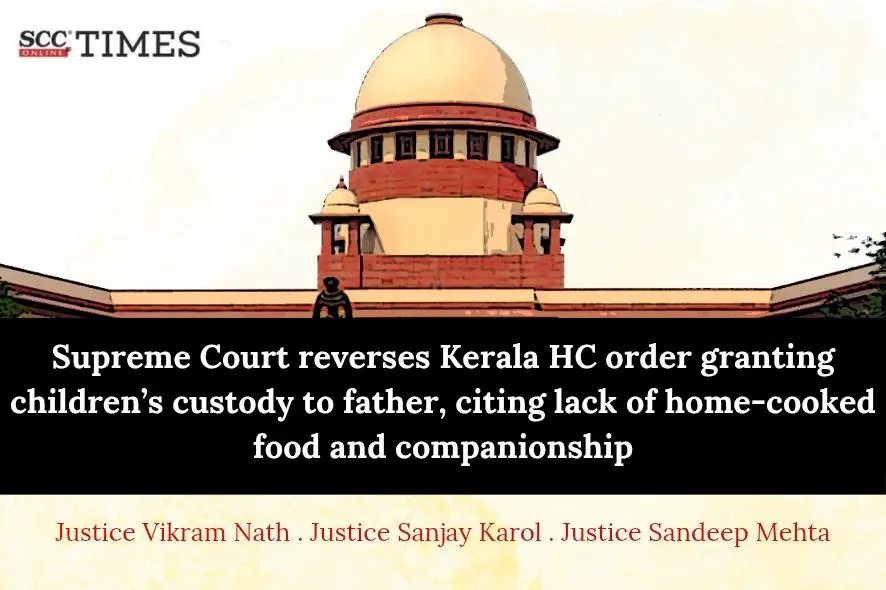Supreme Court: In an appeal challenging the Kerala High Court’s order granting interim custody of the children to the father, a three-judge bench comprising Vikram Nath, Sanjay Karol, and Sandeep Mehta*, JJ., held that the High Court had clearly erred in granting interim custody for 15 days every month. The Court observed that the High Court’s decision was not based on a thorough evaluation of the pros and cons of the situation. It emphasized that the periodic division of custody was detrimental to the children’s physical, mental, and emotional well-being. The Court noted that such an arrangement could ultimately prove harmful and lead to irreversible psychological trauma for both children. As a result, the Court concluded that the High Court’s order granting interim custody to the father for 15 days each month was unsustainable.
Background
The appellant-mother and the respondent-father, both highly qualified professionals, were married in 2014. From their wedlock, two children were born, a daughter and a son. The present dispute pertains to the custody of these two minor children. Currently, the mother is employed with an IT company that permits her to work from home, while the father serves as a General Manager at a construction company based in Singapore. The couple began experiencing marital discord in 2017, which led to their separation, although there were intermittent efforts to reconcile. One such attempt in 2021 resulted in the birth of their second child.
In June 2024, apprehending that the father might forcibly remove the children from her custody, the mother filed a petition before the Family Court, seeking permanent custody under the Guardians and Wards Act, 1890. Pending final adjudication, the Family Court passed an interim order, restraining the father from taking the children from the mother’s custody. Subsequently, the father moved an application, seeking interim custody and visitation rights. By an order dated, the Family Court granted him limited visitation rights. Aggrieved by this limited access, the father filed an Original Petition under Article 227 of the Constitution before the Kerala High Court of Kerala, challenging the Family Court’s order. The matter was adjudicated by a Division Bench of the High Court, which, by the impugned order, granted interim custody of the children to the father. Aggrieved by the High Court’s order the mother approached this Court by way of a special leave petition, assailing the said decision.
Analysis and Decision
The Court took note of its earlier order, wherein it had stayed the operation of the impugned order passed by the High Court insofar as it related to the grant of interim custody of the minor son to the father. Consequently, the custody arrangement for the son, as originally directed by the Family Court, was restored. However, with respect to the daughter, aged eight and a half years, the Court directed that the interim custody arrangement granted to the father under the High Court’s order would continue to remain in force.
The Court, after an ‘in camera’ interaction with the girl child, observed that she appeared to be intelligent, articulate, and composed. She responded to the Court’s questions with maturity and balance, expressing her affection for both parents. However, she conveyed her discomfort with the existing arrangement of alternating 15-day custody between her mother and father. The child candidly shared that during her stay with the father, all meals were ordered from restaurants or hotels, with no home-cooked food provided. She also mentioned feeling lonely, as there was no one to accompany her during that period apart from her father.
The Court reiterated that in cases of child custody, the paramount consideration should be the welfare of the child. The utmost sincerity, love and affection showered by either of the parents, by itself, cannot be a ground to decide the custody of a child.
Taking into account the guiding principles governing child custody and the specific facts of the present case, the Court held that the interim arrangement prescribed by the High Court, granting alternate custody of both children to each parent for 15 days, was neither practical nor conducive to the overall well-being of the children, particularly in terms of their mental and physical health. The Court noted that the younger child, a three-year-old boy, has had minimal interaction with the father, who resides and works in Singapore. Therefore, assigning custody to the father for 15 days every month, even on an interim basis, was deemed wholly unjustified. The Court observed that such a direction could have serious negative consequences on the emotional and physical development of the young child and may instill a sense of insecurity due to the forced separation from the mother. Accordingly, the interim custody arrangement made by the High Court concerning the three-year-old son was found to be unwarranted and unsustainable and was therefore set aside.
Now, turning to the issue of interim custody of the eight-year-old daughter with the father, the Court observed that the intervening circumstances, coupled with the inputs received during its interaction with the child, substantiated the concerns raised by the mother. The child’s statements reinforced the Court’s view that the environment provided by the father during the 15-day interim custody period may not be suitable for her physical and emotional well-being.
The Court highlighted that the continued consumption of food sourced from restaurants or hotels poses a health risk, even for an adult, let alone a young child of eight years. It emphasized that a child of such tender age requires nutritious, home-cooked meals to support her overall health, growth, and development. Regrettably, the father is not in a position to provide the child with such essential nutrition during the interim custody period.
The Court clarified that it had indeed considered the possibility of giving the father an opportunity to make suitable arrangements for providing home-cooked food to the child. However, an additional and significant concern emerged from the child’s statement, that she has no companionship during the 15-day interim custody period apart from the father. This lack of social and emotional support further weighed heavily against granting the father custody of the child at this stage.
The Court observed that it cannot be reasonably expected that, under the periodic custody arrangement, the father would be able to devote uninterrupted attention to the child throughout the entire duration of her stay with him. Given his professional obligations and daily responsibilities, he would inevitably need to allocate time to his work and other pursuits. As a result, the child would be left alone for extended periods, without any companionship or adequate supervision.
In contrast, the Court noted that the mother resides with her parents and benefits from the flexibility of working from home, allowing her to be more present and involved in the children’s daily lives. Additionally, the presence of the younger sibling, a three-year-old boy, provides the daughter with meaningful companionship. As such, the emotional and moral support available to the child in the mother’s household is significantly greater than that provided during the interim custody period with the father. The Court further observed that the 15-day custody arrangement with the father would also result in the daughter being deprived of regular interaction and bonding time with her younger brother.
In this background, the Court held that the High Court had clearly erred in granting interim custody of the children to the father for 15 days every month. It observed that the High Court’s arrangement was not based on a careful evaluation of the pros and cons of the circumstances. The periodic division of custody, the Court emphasized, was detrimental to the children’s physical, mental, and emotional well-being. Over time, such an arrangement may prove to be extremely harmful and could inflict irreversible psychological trauma on both children. Therefore, the Court firmly concluded that the impugned order of the High Court granting interim custody to the father for 15 days each month is unsustainable.
However, the Court acknowledged that the father was a devoted parent who has expressed a strong desire to play an equal and active role in the upbringing of his children. Depriving him entirely of custody would not only be unacceptable but could also jeopardize the possibility of fostering a meaningful family bond.
Therefore, in order to grant the father fair and reasonable access to the children, the Court directed that he be entitled to interim custody of the daughter on alternate Saturdays and Sundays each month. On one of these days, he shall have interim custody of the son for a period of four hours, subject to the child’s comfort. The four-hour custody period with the son shall be supervised by a child counselor, to be engaged by the father with prior approval from the Family Court. To facilitate this arrangement, the father was permitted to either retain the current flat or rent a suitably furnished flat in Thiruvananthapuram. Additionally, the father was expected to make sincere efforts to provide home-cooked meals to the children during the interim custody period.
Furthermore, the Court granted that the father shall be entitled to video calls with both children for 15 minutes every Tuesday and Thursday. The timing for these calls will be mutually agreed upon by the parties, either through direct consultation or with the assistance of their respective lawyers.
The Court directed that the Family Court expedite the decision on the Guardianship petition, bearing filed by the mother, and reversed the impugned order passed by the High Court.
CASE DETAILS
|
Citation: Appellants : Respondents : |
Advocates who appeared in this case For Petitioner(s): For Respondent(s): |
CORAM :











